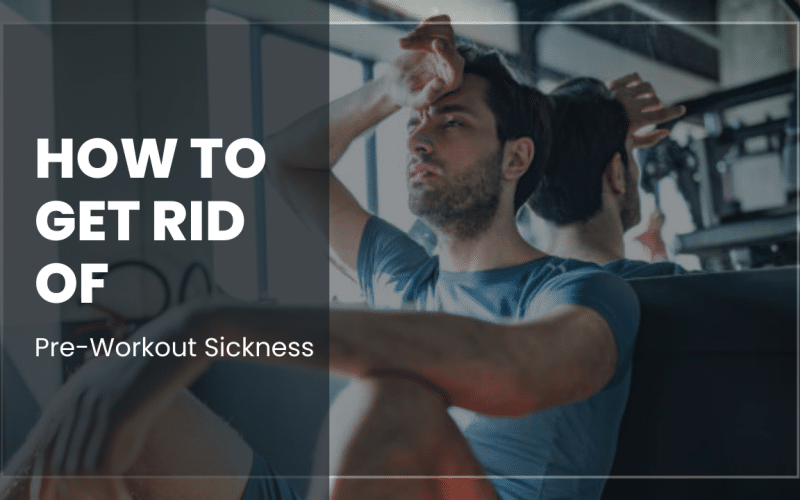There’s nothing like a good workout to burn calories and get the adrenaline pumping. However, when you’re all excited about a workout, it can be a bummer if you start experiencing pre-workout nausea out of the blue.
That queasy or unsettling sensation even before you set foot into the gym or lace up your running shoes, otherwise termed pre-workout sickness, is bound to hold you back from working out.
Whether you’re just starting out or you’re a seasoned athlete, you must address pre-workout sickness to ensure a more productive exercise session.
What Is Pre-Workout Nausea?
Pre-workout sickness, or exercise-induced nausea, is when you have an upset stomach or the feeling of nausea. It’s a common side-effect of pre-workout supplements or intense physical activity and is more common with athletes and fitness enthusiasts.
Not everyone experiences it; it may vary from person to person, depending on their tolerance level and the supplement type they’re using.

Common Symptoms
Pre-workout sickness symptoms may range from mild discomfort to severe symptoms, holding you back from exercising comfortably. Commonly experienced symptoms include vomiting, feeling lightheaded, dizzy, or queasy.
Here’s a list of what pre-workout sickness can manifest into:
- Nausea – feeling uneasy in your stomach with the desire to vomit
- Sweating – perspiration is your body’s response to discomfort or stress
- Lightheadedness – experiencing a sense of loss of balance or feeling like your head is spinning
- Upset stomach – involves cramping, bloating, or feeling full
Other less common symptoms include gagging, loss of appetite, headache, palpitations, and increased salivation.
Reasons for Pre-Workout Sickness
Pre-workout sickness can result from dehydration, stress or anxiety, low blood sugar levels, and consuming too much food before working out. While the exact cause varies from person to person, here are the more common reasons:
High Doses of Pre-Workout Supplements
Pre-workout supplements are high in caffeine and other stimulants that can be dangerous when consumed in large quantities.
Additional ingredients like nitric oxide, beta-alanine, and creatinine can also trigger pre-workout sickness in high doses, causing symptoms like dizziness, vomiting, irregular heartbeat, and nausea.
Alternatively, certain ingredients of pre-workout supplements may cause allergic reactions like itching, hives, and difficulty breathing in some people. Ingredients like preservatives, food dyes, or artificial sweeteners may cause these reactions.
Always check the list of ingredients before consuming any supplements, especially if you have a history of allergies. It would be best to consult your physician before taking any new supplement.
The label on any supplement bottle will always mention the recommended dosage. While some supplements recommend one scoop daily, others suggest two.
The Solution?
If an overdose of supplements is causing you pre-workout sickness, you must stop taking the supplement first. Hydrate by drinking sufficient water, avoid strenuous activities and monitor your symptoms.
If your symptoms worsen, consider consulting with a doctor. You can opt for over-the-counter medications to treat vomiting, headache, or nausea symptoms.
Avoid taking pre-workout supplements on an empty stomach; it can cause stomach discomfort and cramps.
On the other hand, if you’re developing an allergic reaction to your pre-workout supplement, stop taking the supplement, take antihistamines, and seek medical help immediately if symptoms persist.
Dehydration or Electrolyte Imbalance
Drinking too much or too little water or an imbalance in electrolyte levels can also have you feeling pre-workout sickness. Maintaining proper fluid and electrolyte balance is crucial for your body to function optimally.
Moreover, pre-workout supplements can cause dehydration, leading to symptoms of fatigue, nausea, and dizziness. This is because certain ingredients increase blood flow and promote sweating, resulting in loss of fluids and electrolytes.
Ideally, you must mix about 8 – 10 ounces of water into your supplement. However, you’re bound to add more water if you’ve just started using pre-workout supplements or using an all-natural recipe without artificial sweeteners.

The Solution?
Drink plenty of water before, during, and after your workout to avoid dehydration. To replenish electrolytes, drink sports drinks or eat foods high in electrolytes.
Read the label on your supplements; each product has its recommended amount of water ideal for maximum ingredient absorption.
In case you’re experiencing severe dehydration, take a break from physical activity. Keep monitoring your urine color and consult with a doctor if there are any severe symptoms.
Caffeine Overdose
Most pre-workout supplements contain about 325 – 400 mg of caffeine per serving. Considering that the FDA approves 400 mg ideally for daily consumption, that’s a high dose as it is.
Caffeinated pre-workouts often contain stimulants like theobromine, theacrine, or synephrine (or bitter orange extract). These tend to amplify the caffeine effects.
If you drink coffee, cola, or energy drinks with your pre-workout dose of supplements, you exceed the safe caffeine consumption limit.
A regular Cuppa Joe has around 95 mg of caffeine; add that to the caffeine in supplements, and you’ll likely experience an upset stomach, headaches, dizziness, nausea, gastrointestinal distress, or heart palpitations.
The Solution?
You don’t have to stop taking caffeine; you must slow it down and gradually increase your coffee intake. If you wish to continue with pre-workout supplements, consider reducing your coffee dosage.
Keep in mind to monitor your daily caffeine intake and ensure you’re within FDA’s safe limits.
Interaction With Other Medication
Ingredients like nitric oxide, creatine, and caffeine react with certain medications, like blood thinners, causing adverse reactions, affecting blood flow and blood pressure.
If you experience any symptoms caused by pre-workout supplements interacting with other medication, stop taking the supplement immediately.
The Solution?
If you’re on any medication, don’t forget to consult your doctor before starting with a pre-workout supplement.
Too Much Glycerol
Glycerol can improve muscle pumps, hence is a common ingredient in about a quarter of pre-workout supplements.
However, glycerol can induce sensations of nausea, especially if you ingest glycerol-containing pre-workout supplements too close to your workout.
The recommended glycerol intake is 1g/kg of body weight about 1-2 hours before a workout.
The Solution?
Glycerol impacts your body’s water levels; ensure you stay hydrated throughout the day if you take a glycerol-containing pre-workout.
Alternatively, opt for a pre-workout without glycerol.
Nutritional Deficiencies Or Taking Pre-Workout on an Empty Stomach
One of the main reasons you may feel sick before hitting the gym is when you take pre-workout supplements on an empty stomach. It is a common misconception that taking pre-workout supplements before a meal gets the ingredients to work faster.
What’s going to happen is that the creatine, caffeine, glycerol, and L-citrulline levels will rise rapidly in your blood.
A poor diet will also cause nutritional deficiencies and make you feel sick and nauseous when taking a pre-workout.
The Solution?

Ideally, you must eat around an hour before your workout. If it’s been over two hours since you last ate, ensure you eat a snack about 30 minutes before taking your supplements. Else, your blood sugar could drop, making you feel sick.
If you prefer working out without eating, at least consume a small portion of fruit or a handful of nuts to stabilize blood sugar levels.
Also Read: Does Pre-Workout Make You Gain Weight?
High Creatine Level
Creatine is a natural substance found in fish and red meat, and our bodies break it down into ATP for energy. It’s typically an ingredient in many pre-workout supplements since it’s cheap, safe, and gives you that extra energy.
The typical creatinine in one serving of most pre-workout supplements is 1 – 4 grams. If consumed incorrectly, like with a lot of sweets, it can cause nausea and upset stomach. Sugar doesn’t pair well with creatine; taking a pre-workout supplement and eating too much sugar will cause you to feel unwell.
Consuming 8 – 10 grams of creatine daily will also negatively impact your health. It’s essential to drink enough water when consuming it.
The Solution?
Get a creatine-free pre-workout supplement. Or try pairing it with high-carb foods like whole-grain toast.
If you’ve already bought a pre-workout with creatine, it’s best to avoid its other sources all day.
Too Much L-Citrulline
If you’re wondering what L-citrulline is, it’s an amino acid usually included as Citrulline Malate in pre-workouts and is bounded to malic acid.
L-citrulline converts to Arginine in your body and increases nitric oxide levels. It causes the arteries to widen, improving blood flow – the reason for the epic pump with pre-workouts.
Apart from functioning as a vasodilator, it’s also essential for protein synthesis. The recommended intake of L-citrulline is 3 – 6 grams. So, if you consume more than 8 grams of it daily, you’ll experience an abrupt drop in your blood pressure, leading to pre-workout sickness.
The Solution?
Look for a pre-workout with minimal L-citrulline. If you cannot do that, you must ensure there’s no L-citrulline in any other supplements you’ll take for the day.
How To Prevent Pre-Workout Nausea?
To prevent pre-workout sickness, start with a lower supplement dose, then gradually increase it over time. This allows your body to adjust to the ingredients in the supplement.
Keep yourself hydrated by drinking plenty of water before and during your workout; it helps reduce the risk of nausea.
Avoid consuming caffeine or other stimulants before your workout.
Eat a light meal or snack about 30 minutes to an hour before exercising; it’ll provide your body with sufficient energy without causing digestive issues. It’s best to avoid heavy meals or foods high in fat or fiber for your pre-workout intake.
Gradually increase the intensity of your workouts instead of engaging in high-intensity exercises right away.
If you feel nauseous during your workout, consider taking breaks to help alleviate symptoms. Simply sit down for a few minutes till you feel better to continue with your routine. Take deep breaths and focus on relaxing techniques.
If you’re already experiencing pre-workout nausea, take it easy, have a snack, and start slow if you can. Else, you can go home and rest it out, and strategize for your next workout.
Note: If pre-workout sickness persists despite these measures, try switching to a different type of supplement that agrees better with your body. Alternatively, consult with a healthcare professional for further evaluation.
Frequently Asked Questions (FAQs)
1. Should I stop taking pre-workout if it makes me nauseous?
If your pre-workout supplement only got you slightly queasy and you could continue with your workout, this can be categorized as a mild annoyance. You’ll most likely be able to overcome this sooner.
However, you must consider reducing the supplement dose if it causes you to almost throw up. If that also doesn’t help, it’s best you switch to a pre-workout free of creatine/caffeine/L-citrulline.
2. How long does pre-workout last?
The duration of a pre-workout sickness depends on several factors, including the amount of pre-workout you consume, caffeine intake, creatine, etc.
Usually, pre-workout sickness can last between 30 minutes to 3 hours. The more pre-workout supplement you consume, the longer your sickness lasts.
3. Are there any severe side effects of taking pre-workout?
When taken in moderation and within the recommended dose, pre-workouts are safe. There’s the off-chance that you might deal with prolonged side effects like jitters, increased heart rate, abdominal discomfort, insomnia, etc.
Consider consulting with a healthcare professional or dietitian if you experience any side effects. Alternatively, try another pre-workout.
4. Will a stimulant-free pre-workout still make you sick?
While less likely, stimulant-free pre-workouts may still cause a stomach upset. Although stimulants are known to commonly cause nausea, other ingredients like glycerol, creatine, or sodium bicarbonate can also make you sick.
Summing It Up
Pre-workout supplements are beneficial when taken the right way. You must pay close attention to the supplement’s ingredients to ensure you aren’t consuming unhealthy amounts of creatine or caffeine.
If you’re feeling sick, you needn’t necessarily stop taking your pre-workout; instead, analyze what you’re doing wrong and try to fix it.
There are several ways to overcome pre-workout sickness, including opting for a different pre-workout without the ingredients that don’t suit you or reducing the amount you consume.






